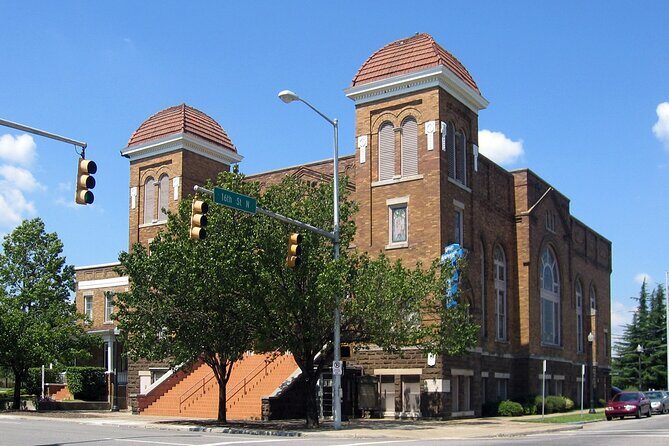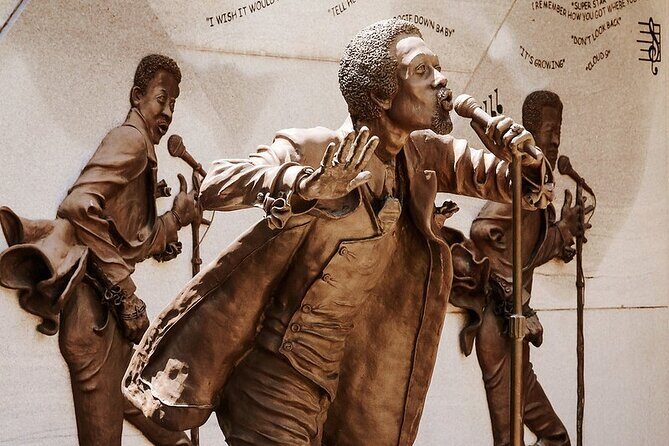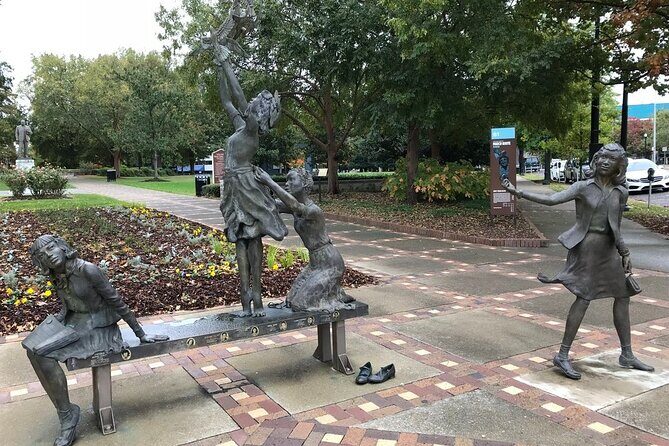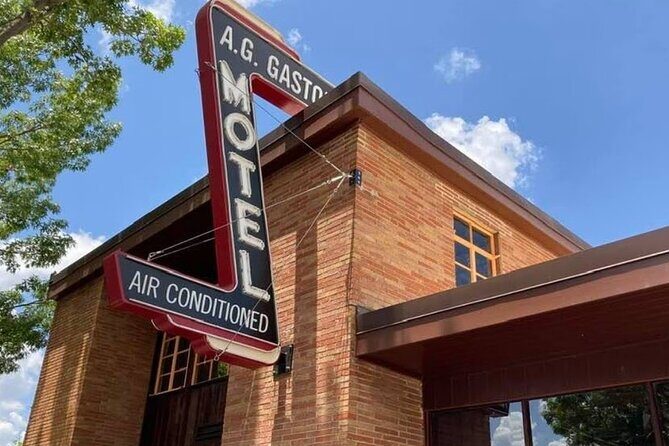Experience Birmingham’s Civil Rights History on Foot
If you’re visiting Birmingham, Alabama, and want to understand the city’s pivotal role in the Civil Rights Movement, the 1963 Birmingham Civil Rights Experience – Black History Matters Walking Tour offers a compelling way to do so. Priced at $50 per person and lasting roughly 1 to 1.5 hours, this tour takes you through some of Birmingham’s most significant historical landmarks, with a guide who grew up in the city and knows its story inside out.
What we particularly appreciate is the mix of visiting iconic sites like Kelly Ingram Park and the 16th Street Baptist Church—both loaded with history—and having a local guide share personal insights that bring the story to life. The tour’s walkable format means you stay active while soaking in the history, which makes it a more engaging experience than just sitting in a museum.
One thing to keep in mind is that the meeting point can be a bit confusing, and some reviews mention issues with punctuality. Still, for those interested in Black history and civil rights, this experience offers a valuable, emotionally resonant snapshot of Birmingham’s past. It’s best suited for travelers who want a concise, insightful overview that combines historical education with authentic storytelling.
This experience made our article of Which Birmingham Tours To Choose? We Rank The 10 Best.
Key Points

- In-depth local knowledge from guides with personal ties to Birmingham’s history.
- Key landmarks like Kelly Ingram Park and the 16th Street Baptist Church provide powerful visual context.
- The walking format keeps you physically engaged while exploring important sites.
- Affordable price for a guided tour that covers major civil rights locations.
- The small group size (max 30) ensures personalized attention and fewer crowds.
- Flexibility with a free cancellation policy, allowing for stress-free planning.
A Walk Through Birmingham’s Civil Rights Landmarks
We loved the way this tour intertwines the city’s physical spaces with powerful stories of struggle and resilience. Starting at the intersection of 3rd Ave and 20th St N, the tour kicks off with an overview of Birmingham’s Black contributions, including the 1926 Red Line Zoning laws and the Palm Leaf Hotel—fascinating details that set the stage for the civil rights stories to come. Our guide explained how these policies shaped Birmingham’s urban landscape and segregated communities, making the history feel tangible.
If you're drawn to exploring Birmingham on foot, we've looked into these other walking experiences
The Significance of Eddie Kendrick Memorial Park
Next, we visited the Eddie Kendrick Memorial Park, dedicated to the founding member of The Temptations. It’s a small but meaningful site that connects Birmingham’s African American cultural history with its civil rights story. Walking around the park, you get a sense of how the city’s Black community thrived despite adversity. You might also see remnants of what was once a vibrant neighborhood known as “city within a city,” such as Nelson Brothers and Green Acres.
Carver Theater and the Cultural Scene
The Carver Theater, now home to the Jazz Hall of Fame, is a reminder of Birmingham’s rich Black cultural life. It’s a beautifully preserved venue that once served as a major entertainment hub for Black residents and remains a powerful symbol of resilience. Nearby, you’ll see the Prince Hall “Colored” Masonic Lodge, adding depth to the understanding of community organization and social cohesion during segregation.
Kelly Ingram Park: A Place of Protest and Reflection
Perhaps the most emotionally charged stop is Kelly Ingram Park, where sculptures depict moments from the civil rights protests. This park was a gathering spot for Birmingham’s civil rights activities and has been renovated to honor those struggles. Reviewers highlight the powerful sculptures and the way the park helps visitors connect with the emotional weight of Birmingham’s civil rights battles. One reviewer noted, “Her stories from her deep knowledge helped us understand the context of civil rights in Birmingham,” emphasizing how a guide’s storytelling enhances the experience.
The 16th Street Baptist Church: A Symbol of Sacrifice
The 16th Street Baptist Church is perhaps the most famous landmark on the tour. The tragic bombing in 1963, which killed four young girls, is a stark reminder of the violent resistance faced by civil rights activists. Although the church’s interior isn’t included in this tour, the exterior and memorials serve as potent symbols of loss and hope. Visitors often comment on the emotional impact of standing outside this historic site. As one reviewer said, “The statue depicting the four girls was very moving—I wanted to do the museum, but it was closed.”
Interested in history? Here are other past-focused experiences we've examined in Birmingham
Exploring Black Entrepreneurship and Resilience
The A.G. Gaston Motel offers insight into Black enterprise and entrepreneurship. Built by prominent businessman Arthur G. Gaston, it was a symbol of Black economic independence. Our guide explained how this motel was a hub for civil rights strategizing and community organizing, emphasizing how Black-owned businesses played a crucial role during segregation.
The Lyric Theatre: Segregation and Entertainment
The Lyric Theatre is the last standing venue that allowed mixed (though still segregated) audiences. It reflects Birmingham’s cultural resilience and the evolving social landscape. Its existence underscores how Black communities navigated segregation—sometimes pushing boundaries and creating spaces for shared experiences.
What to Expect During Your Tour

The tour begins promptly at the designated meeting point and is conducted primarily on foot, with a total distance manageable for most physically fit travelers. The group remains small—capped at 30—ensuring your guide, Wilhelmina, can share detailed stories and answer questions. The walking pace is moderate, and the tour lasts around 1 to 1.5 hours, making it a perfect short activity that deepens your understanding of Birmingham’s civil rights history without exhausting you.
While the tour covers many compelling sites, some attractions like the 16th Street Baptist Church require separate visits if you wish to explore further. The tour itself provides a meaningful, narrative-driven overview that connects these sites through stories and historical context. Reviewers repeatedly praise Wilhelmina for her depth of knowledge and her personal stories, which give a sense of authenticity that reading a book or viewing plaques alone can’t match.
Travel and Accessibility
The starting point is in a central location with parking nearby, making it convenient for visitors arriving by car. The tour is suitable for individuals with moderate physical fitness, given the walking involved. Service animals are permitted, which is helpful for those traveling with assistance animals.
Price and Value
At $50 per person, the tour offers good value, considering the expert guidance and access to sites that are often free to visit but far more meaningful when narrated by someone with personal ties and local knowledge. Several reviews mention that the guide’s stories and inside knowledge elevate this experience from a simple walk to a memorable education.
Be Prepared for Emotional Moments
Some stops, particularly Kelly Ingram Park and 16th Street Baptist Church, can evoke strong emotions. Expect to encounter powerful sculptures and memorials that honor those who suffered and fought for civil rights. This tour is as much about understanding history as it is about connecting with the resilience and courage of Birmingham’s Black community.
Final Thoughts: Who Should Consider This Tour?

This tour is an excellent choice for those who want a focused, engaging overview of Birmingham’s civil rights history in a short time. It suits history buffs, educators, students, or anyone interested in Black history and social justice. The combination of local guides with personal experience and powerful sites makes it a compelling way to connect with the city’s past, especially if you prefer walking to buses or museums.
If you’re a traveler who seeks authentic stories and meaningful landmarks, this tour offers a respectful, insightful, and emotionally resonant experience. Just keep in mind the importance of punctuality, and be prepared for an emotionally charged walk through some of the most significant moments in American civil rights history.
FAQ

How long does the tour last?
The tour typically lasts about 1 to 1.5 hours, covering several key sites in downtown Birmingham.
Where does the tour start and end?
It begins at 285 20th St N, Birmingham, and ends back at the same location, making it easy to plan around.
Is the tour suitable for all physical fitness levels?
Yes, but it’s recommended that participants have moderate physical fitness as it involves walking and standing at various sites.
Are tickets refundable?
Yes, you can cancel up to 24 hours in advance for a full refund. Last-minute cancellations aren’t eligible for refunds.
What sites are included in the tour?
Major stops include Kelly Ingram Park, 16th Street Baptist Church, Carver Theater, A.G. Gaston Motel, and the Lyric Theatre.
Is there a guide or tour leader?
Yes, Wilhelmina is the guide, renowned for her knowledge and personal stories that bring Birmingham’s civil rights history alive.
Do I need to book in advance?
Yes, it’s recommended to book about 26 days ahead to secure your spot, especially during busy travel seasons.
What is the price?
The tour costs $50 per person, which is a fair price considering the access to prominent sites and the guide’s insights.
Are there any additional costs I should be aware of?
Admission to sites like the 16th Street Baptist Church is not included in the tour price, but most other stops are free.
In choosing this tour, you gain more than just a list of historical sites—you get an intimate, real-life perspective on Birmingham’s civil rights journey. For those eager to walk away with stories, understanding, and a sense of connection, this experience makes history come alive.
More Walking Tours in Birmingham
- Birmingham Ghosts: Haunts, Spirits, and Poltergeists Walking Tour
- The Birmingham Downtown Ghost Self-Guided Walking Tour
- Walking Tour: Civil Rights History -The Church, Children & Community
- Birmingham Civil Rights Walk of Freedom Smartphone Audio App Tour
- Adventurous Walking Tour of University of Alabama
- Birmingham Civil Rights Tour- Riding & Walking
More Tours in Birmingham
- VIP “TwentyFun” Birthday Tour
- Footsteps to Freedom Self-Guided Tour Through Birmingham
- Birmingham Ghosts: Haunts, Spirits, and Poltergeists Walking Tour
- The Birmingham Downtown Ghost Self-Guided Walking Tour
- Walking Tour: Civil Rights History -The Church, Children & Community
- Birmingham Civil Rights Walk of Freedom Smartphone Audio App Tour
More Tour Reviews in Birmingham
- VIP “TwentyFun” Birthday Tour
- Birmingham Civil Rights Scavenger Interactive Hunt Activity
- Footsteps to Freedom Self-Guided Tour Through Birmingham
- Birmingham Ghosts: Haunts, Spirits, and Poltergeists Walking Tour
- Murder Mystery Detective Experience in Tuscaloosa AL
- Unique Scavenger Hunt in Birmingham by Wacky Walks
More Birmingham experiences we've covered
- VIP “TwentyFun” Birthday Tour
- Birmingham Civil Rights Scavenger Interactive Hunt Activity
- Footsteps to Freedom Self-Guided Tour Through Birmingham
- Birmingham’s 8 Best Walking Tours (With Prices & Reviews)
- What Are The Best Historical Tours In Birmingham? Our Top 3 Picks
- Which Birmingham Tours To Choose? We Rank The 10 Best
- Birmingham Ghosts: Haunts, Spirits, and Poltergeists Walking Tour
- Murder Mystery Detective Experience in Tuscaloosa AL
- Unique Scavenger Hunt in Birmingham by Wacky Walks
- The Birmingham Downtown Ghost Self-Guided Walking Tour
- Birmingham Area Family Fun Multi-Attraction Pass
- Celebrate with a Holiday Scavenger Hunt in Birmingham with Holly Jolly Hunt
